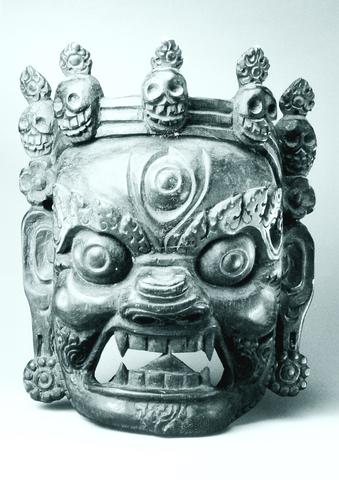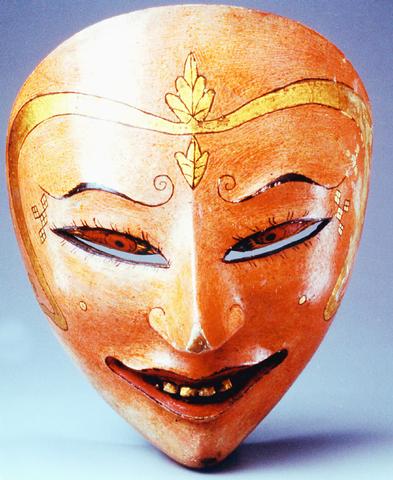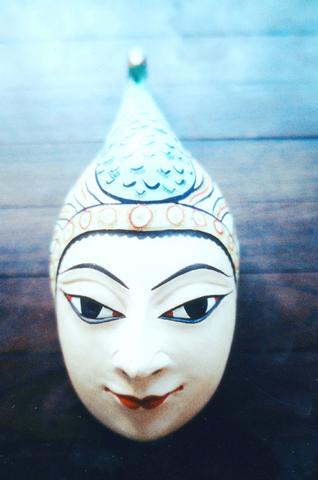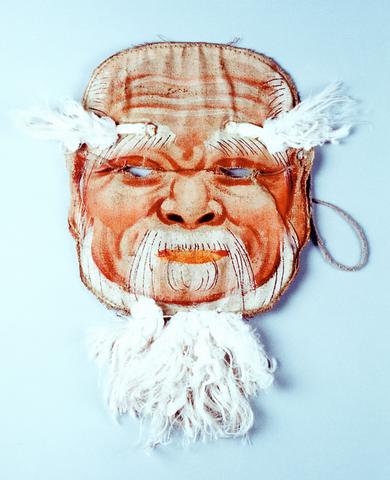The Second Miaoli International Mask Festival (第二屆苗栗國際假面藝術節), which opened Saturday, is presenting one of the most comprehensive exhibitions of Asian masks ever held in Taiwan. The event, which runs until April 29, will also incorporate an array of folk music and dance performances associated with the use of masks.
The exhibition and performances are sponsored by the Miaoli County Culture Bureau (

PHOTO COURTESY OF ACEF
The current exhibition, which focuses on Asia, contains 403 masks, many of them over a century old. Highlights of the exhibition are two sacrificial masks from Java which date back 1,000 years, one of which is made of gold, the other of bronze. Securing these objects' shipment to Taiwan for the show was perhaps the event's biggest coup. "Insurance made up a large part of the expenses for this show," said Chou.

PHOTO COURTESY OF ACEF
The mask exhibition takes the form of an installation art display and aims to cover the two main traditions of mask art in Asia, Chinese and Indian. Chou said said viewers will be able to see the frequent overlap of the traditions,especially visible in the mask art of regions like Tibet. Featured masks originate from Mongolia, Tibet, China, Japan, Taiwan, Thailand, India, Nepal and Sri Lanka.
The Miaoli Mask Festival was initiated in 1999 during the preparation for the construction of the Sanyi Museum of Wood Sculpture (三義木雕博物館), when cultural administrators happened upon the strong vein of mask art that exists within Miaoli's wood carving tradition.

PHOTO COURTESY OF ACEF
The subtitle of the show "Masks, a Banquet for the Soul" (假面的藝術,心靈的饗宴) is intended to emphasize the important role that masks play in expressing religious aspirations and the importance of masks in traditional culture.

PHOTO COURTESY OF ACEF
Although masks are not commonly used in Chinese ritual or performance, Hakka (客家) culture, which is strongly represented in Miaoli, uses masks in funeral rites, which explains the choice of Miaoli for the event.
Hakka masks will be on display, as will another form of Chinese masks, called "Nuo" (儺面), which date back to the Tang dynasty (618-907) and are currently only used in China's relatively isolated Guizhou (貴州) and Jiangxi (

PHOTO: TIFFANY FENG, TAIPEI TIMES
One of the most dynamic elements of the festival will be performances by troupes from all over the world. These will be held in many different locations around Miaoli and most, with the exception of those by higher-profile dance groups, will be free.
Organizers say the event is a rare opportunity to learn about the rich heritage and multiple religious and cultural usages of masks. "By wearing a mask I represent a ghost. In the northeast of Thailand, the masked performers scare away evil spirits that lurk in the wilderness," said one ghost performer of the Nongkhai Dramatic Art Club (農凱戲劇藝術團) from Thailand.
Members of Mongol National Ethnic Dance Group (蒙古國家民族歌舞團) said that their masks were representations of Buddha, and their performance was intended to subdue demons and enhance people's faith in Buddhism.
Fu Hsueh-peng (傅學鵬), Miaoli County commissioner, said he hoped the arts festival would become a regular event to show off Miaoli's culture and give Miaoli residents a chance to learn more about the cultures of other nations.
What: The Second Miaoli International Mask Festival (
When: April 1 to April 29, 9am to 9pm
Where: Miaoli County Culture Bureau (
Ticket: Exhibition NT$100; Performances, free or NT$100 to NT$500
For more information call (037) 352-961 ext. 611-614 or check out the festival Web site at http://www.mask.org.tw.

In the March 9 edition of the Taipei Times a piece by Ninon Godefroy ran with the headine “The quiet, gentle rhythm of Taiwan.” It started with the line “Taiwan is a small, humble place. There is no Eiffel Tower, no pyramids — no singular attraction that draws the world’s attention.” I laughed out loud at that. This was out of no disrespect for the author or the piece, which made some interesting analogies and good points about how both Din Tai Fung’s and Taiwan Semiconductor Manufacturing Co’s (TSMC, 台積電) meticulous attention to detail and quality are not quite up to

April 21 to April 27 Hsieh Er’s (謝娥) political fortunes were rising fast after she got out of jail and joined the Chinese Nationalist Party (KMT) in December 1945. Not only did she hold key positions in various committees, she was elected the only woman on the Taipei City Council and headed to Nanjing in 1946 as the sole Taiwanese female representative to the National Constituent Assembly. With the support of first lady Soong May-ling (宋美齡), she started the Taipei Women’s Association and Taiwan Provincial Women’s Association, where she

Chinese Nationalist Party (KMT) Chairman Eric Chu (朱立倫) hatched a bold plan to charge forward and seize the initiative when he held a protest in front of the Taipei City Prosecutors’ Office. Though risky, because illegal, its success would help tackle at least six problems facing both himself and the KMT. What he did not see coming was Taipei Mayor Chiang Wan-an (將萬安) tripping him up out of the gate. In spite of Chu being the most consequential and successful KMT chairman since the early 2010s — arguably saving the party from financial ruin and restoring its electoral viability —

It is one of the more remarkable facts of Taiwan history that it was never occupied or claimed by any of the numerous kingdoms of southern China — Han or otherwise — that lay just across the water from it. None of their brilliant ministers ever discovered that Taiwan was a “core interest” of the state whose annexation was “inevitable.” As Paul Kua notes in an excellent monograph laying out how the Portuguese gave Taiwan the name “Formosa,” the first Europeans to express an interest in occupying Taiwan were the Spanish. Tonio Andrade in his seminal work, How Taiwan Became Chinese,